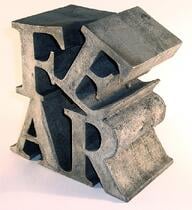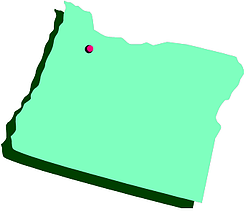If you live in Oregon and receive a notice that your wages are going to be garnished, here's what you need to do:
We get calls almost every day from someone who has just received a notice from their employer that they are going to have their check garnished.
Most of those callers seem surprised by the garnishment, and yet, they should have know it might happen!

First of all, a wage garnishment cannot "just happen".
Carrying too much debt (specifically, unsecured debt) plagues 7 out of 10 people.
Most of our clients called us because they had experienced a devastating experience in their lives which caused them to turn to the easy access of credit cards for help.
See if this sounds familiar:
You lost your job. But, you weren't too worried, because you were pretty sure you'd find another one within a couple of months or so.
Well, it just didn't happen.
So, you burned through what ever little bit of emergency savings you had and now, you had to start using your credit card for things like:
- Gasoline
- Groceries
- And/or for that major appliance repair!
Soon, your were at the limit on your card and had to start using a second card.
You knew you shouldn't, but what else could you do?
As the months went by, and you still could not find a job that at least would pay you as much as your old job, the bills started adding up and up and up!
It wasn't long before you just couldn't keep up with the minimum payments on your credit cards and missed a payment here and there.
Soon, the creditors started sending "nasty" letters threatening this or that.
And if the letters weren't bad enough, the CALLS STARTED! Lots of calls!
Sure, you tried to explain your situation to the agent calling, but they didn't seem to care. So, you stopped answering the calls.
BY-THE-WAY...
As long as your account is with the original creditor, you cannot stop the calls. You agreed to this somewhere in the fine print when you applied for the credit card.
But, after a month or so, the calls stopped and the letters seem to slow down as well.
You were hoping that maybe they would forget about you so you would have more time to find a good job and get caught up.
The good news...
You finally were hired and the salary was even just a little more than before!
The bad news...
Your account was charged off by your original creditor and assigned or sold to a DEBT COLLECTION COMPANY.
Now you began to get letters and calls from the debt collector, and you soon realized that they were a less sympathetic than the original agent was!Much less!
So, you stopped answering the phone.
Even though they left a message, you didn't return it because you knew that it wouldn't do any good.
BY-THE-WAY...
Now you can put a stop to the collection calls! Here's how:
Well, the calls did stop, but the letters kept coming.
Some of the letters had a SETTLEMENT OFFER, and although it was an offer to reduce the amount you owed, you were still digging your way out of the financial hole you were in and just couldn't afford to pay 50%-75% of the balance in a lump sum within 30 days!
COME ON.....REALLY?
A few more months went by and then one evening, the door bell rings and there's a guy with a registered letter for you.
You sign for it...open it up...and guess what????
YOUR HAVE JUST RECEIVED A SUMMONS!
You start to read the first page and it sounds like you are going to have to go to court to give an "answer" about your debt!
The truth is, that you don't have to go to court (at least not yet).
The ANSWER is a legally prepared explanation with the proper PROOF that you do not owe this debt that the summons says you owe!
But, since you know you owe the debt, you don't do anything.
Again, THE GOOD NEWS....
You don't hear anything for a couple of more months.
But, THE BAD NEWS...
Since you didn't do anything about the summons, the PLAINTIFF (that's the debt collector and/or original creditor) was awarded a JUDGMENT against you for the full balance at the time of default...plus interest...plus fees... and court costs!
This is also called a DEFAULT JUDGMENT as it was awarded without defense, by default by you, the DEFENDANT.
Up to this point, the creditor/debt collector COULD NOT apply for a garnishment.
Many people mistakenly think that if they just get behind on their bills that a creditor or debt collector can just "take their money or property".
No, they have to go through the whole legal process first.
But now, AND ONLY NOW, with the DEFAULT JUDGMENT, the Plaintiff can apply for a Writ of Garnishment.
And, now you get a notice from your employer that they received a WRIT OF GARNISHMENT on you.
This means that they have no option but to withhold 25% (the usual amount in most states) from each of your paychecks until the full amount is repaid.
And oh, by-the-way, each state allows additional interest to be added!
- Here in Oregon, it is 9% annually.
- In Washington, it's 12%!
Now let's stop for a minute and do some math.
- Let's say you earned $5,000/month from you new job, and you receive approximately $2,500 every two weeks.
- After City, State and Federal taxes are deducted, your net/take-home pay is $1,750 every two weeks.
- Take $1,750 less 25% for the wage garnishment, and now your take-home pay is only $1,225!
- It was tough paying all the bills on $1,750 every two weeks, but now, you are going to have $525 less or a total of $1,050 less each month!
- $525 is mailed to the Plaintiff, and will be until the full balance from the judgment is satisfied!
How in the world are going to make it now!
You only have a couple of options:
- DEBT SETTLEMENT
- BANKRUPTCY
I'm not going to get into all of the details of the two options above in this blog, but if you'd like more information, click below:
OPTIONS FOR STOPPING A WAGE GARNISHMENT
Let me wrap this up...
The time to put a stop to a garnishment, in Oregon or any state, is BEFORE the creditor/debt collector FILES A CLAIM to start the SUMMONS/JUDGMENT process.
Most of the time, a debt collector would much rather accept a SETTLEMENT instead of going through all the time and expense of seeking a judgment.
Even if you have a JUDGMENT AGAINST YOU, there is still an opportunity to STOP THE LEGAL PROCESS.
You should be able to get a STIPULATED AGREEMENT in place that would stop the creditor/debt collector from moving forward with legal action.
If all of this sounds good, but you need some help or advice, let us know.









 If you are looking for a debt settlement company in Oregon or anywhere else in the country for that matter, there are 5 things to look for:
If you are looking for a debt settlement company in Oregon or anywhere else in the country for that matter, there are 5 things to look for:
 We all know that "Money Doesn't Grow on Trees", right? When we work hard all week long, we want to be able to see the fruits of our labor. When creditors garnish your wages, it can be devastating.
We all know that "Money Doesn't Grow on Trees", right? When we work hard all week long, we want to be able to see the fruits of our labor. When creditors garnish your wages, it can be devastating.
